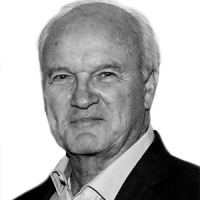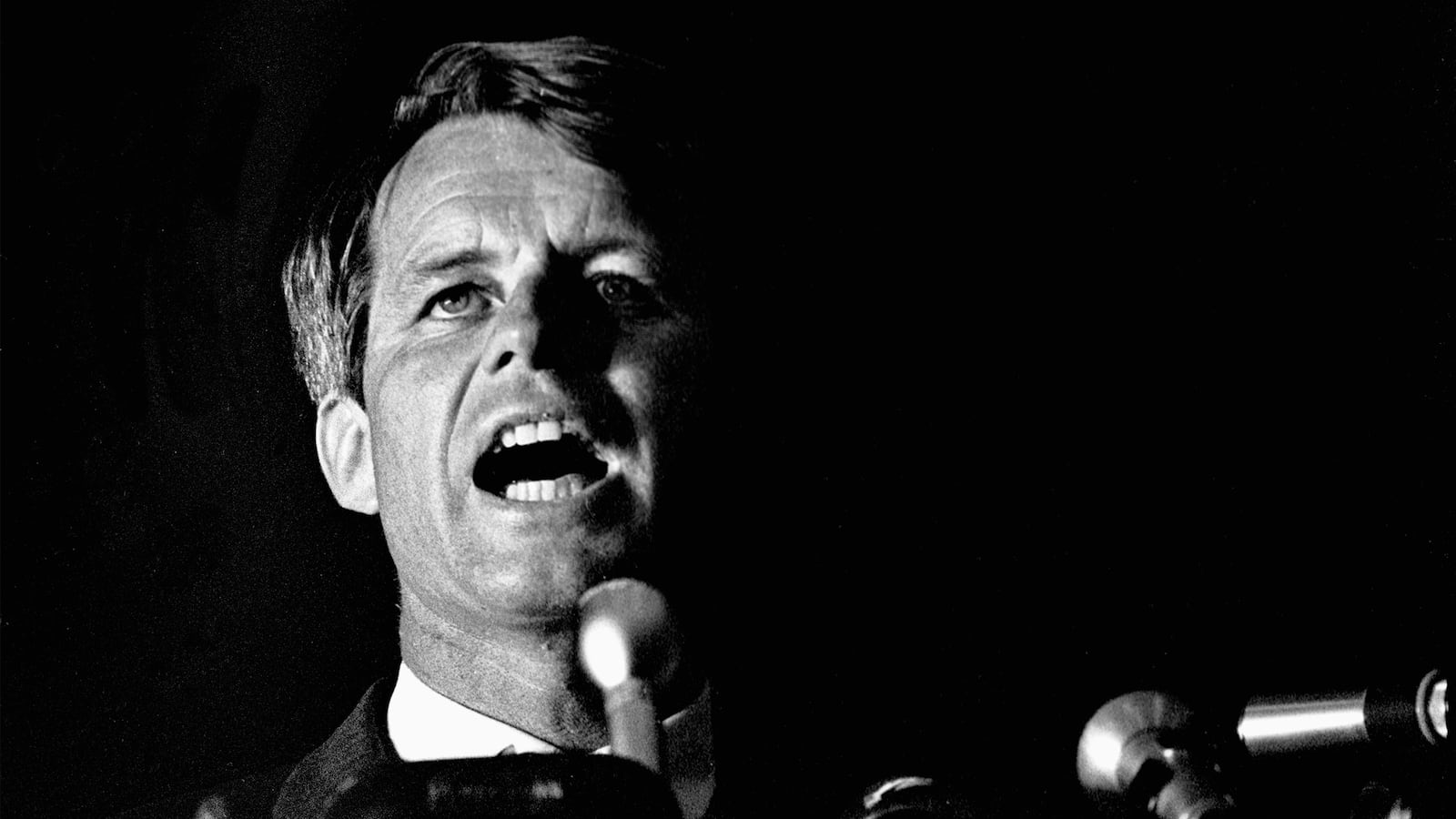About 9 p.m. on a cool April night 48 years ago, at 17th and Broadway in Indianapolis, Bobby Kennedy turned a street corner into a church. He was running for president in the Indiana Democratic primary less than a month away and a largely African-American crowd of over 2,000 people had gathered to hear the senator from New York, who began the day with rallies at Notre Dame and Ball State University.
While Kennedy flew from Muncie to Indianapolis, Martin Luther King died after being shot by a white man, James Earl Ray, in Memphis. The country was already reeling in that combustible political year; that winter’s Tet Offensive in South Vietnam was the death knell for America’s waning support for another long war. Gene McCarthy challenged Lyndon Johnson from the left. George Wallace, his rhetoric and demeanor, divided the Democrats’ working-class base. LBJ had just thrown in the towel, announcing he would not run for re-election and now Dr. Martin Luther King was dead on a motel balcony in Tennessee, his life erased at the hand of an assassin.
So here was Robert Kennedy, climbing up on the back of a flatbed truck, standing alone before a group of people largely unaware of what had happened a few hundred miles away, just a few hours earlier. There were no 24-hour cable news channels, no tweets or texts, no emails, no smart phones, Facebook or Instagram.
“I have bad news for you,” he said, the hurt in his voice apparent. “For all of our fellow citizens and people who love peace all over the world and that is that Martin Luther King was shot and killed tonight."
The crowd reeled in disbelief, a wave of murmurs and gasps filling the night as Kennedy continued speaking without notes, the words emerging from the pain of his own experience, his own life.
“In this difficult day, in this difficult time for the United States, it is perhaps well to ask what kind of nation we are and what direction we want to move in. For those of you who are black—considering the evidence there evidently is that there were white people who were responsible—you can be filled with bitterness, with hatred, and a desire for revenge.
“We can move in that direction as a country, in great polarization—black people amongst black, white people amongst white, filled with hatred toward one another…
“For those of you who are black and are tempted to be filled with hatred and distrust at the injustice, against all white people, I can only say that I feel in my own heart the same kind of feeling. I had a member of my own family killed, but he was killed by a white man…
“What we need in the United States is not division; what we need in the United States is not hatred; what we need in the United States is not violence or lawlessness, but love and wisdom and compassion toward one another and a feeling of justice toward those who still suffer within our country, whether they be white or they be black.
“So I shall ask you tonight to return home, to say a prayer for the family of Martin Luther King, that’s true, but more importantly to say a prayer for our own country, which all of us love—a prayer for understanding and that compassion of which I spoke.”
In the hours following the candidate’s street-corner sermon, one hundred American cities burned. Thirty-nine people were killed in riots and thousands more were injured but Indianapolis did not burn because the embers of rage were stamped out by one man’s lone voice of reason, a leader speaking sense.
On another American night, Friday night in Chicago, calamity once again collided with a candidate’s schedule. A scheduled appearance by Donald Trump was canceled when it became obvious that hundreds had arrived in the hall with the specific intent to throw the night into chaos and not allow Trump to be heard.
For months now, Trump’s traveling road show has entertained and energized thousands who come to hear him either out of curiosity or commitment. And he rarely disappoints.
But slowly, surely and inevitably Trump seems to have surrendered to the narcotic of adulation and aspiration that flows from his large, boisterous, often angry crowds. It seems as if his ego and narcissism encourage him to think and believe that no other candidate has ever heard such cheering, received such adulation or applause. A rookie’s weakness.
He poses, pauses, parades on stage, capturing and captivating the crowds, waving applause lines like a baton … “We’re going to build a wall…We’re going to make America great again…Get him out of here.”
The weekend’s eruptions in St. Louis and Chicago around Trump’s candidacy were nothing new. The flame has been simmering for months, the low fire burning beneath the surface as the candidate arrives with an arsonist’s vocabulary, standing off to the side as the crowd roars approval.
Trump does not have the dark heart of a racist or a hater. He is, it appears, simply a man of huge ego and narcissism whose ambition, chip on his shoulder, his background and the fact he feels he has never been truly respected now prevent him from seeing what is actually right in front of him: ordinary Americans left behind by an economy and a culture that has damaged the lives, dreams and hopes of so many who listen to him and are quickly emboldened to behave like an army of antagonists to the unseen enemies who stole a country that exists only in myth.
Trump’s words do not inspire his crowds. They anger. He does not encourage. He aggravates. He does not appeal to our strength. He focuses on the weakest elements of human nature, envy, anxiety, and apprehension of what might happen to America without him at the helm.
He is not a bad man. He is just one more public man who thinks and believes that each image of himself in the mirror reflects an individual greatness no one else owns. This, of course, makes him not that much different from the many who have ever announced for the presidency.
All those years ago, 48 of them, when America was truly rocked back on the ropes by war, riots, assassinations, violence and a future seemingly wrapped in trauma, Robert F. Kennedy left Indianapolis for Cleveland, Ohio where he spoke on April 5, the day after Martin Luther King was killed.
“Too often we honor swagger and bluster and the wielders of force,” he told the City Club of Cleveland. “Too often we excuse those who are willing to build their own lives on the shattered dreams of others…
“We must admit the vanity of our false distinctions among men and learn to find our own advancement in the search for the advancement of all. We must admit in ourselves that our own children’s future cannot be built on the misfortunes of others…
“But we can perhaps remember—even if only for a time—that those who live with us are our brothers, that they share with us the same short movement of life, that they seek—as we do—nothing but the chance to live out their lives in purpose and happiness, winning what satisfaction and fulfillment they can. Surely this bond of common faith, this bond of common goal, can begin to teach us something…and surely we can begin to work a little harder to bind up the wounds among us and to become in our own hearts brothers and countrymen once again.”
Robert F. Kennedy spoke on April 5, 1968, a long-gone time when the country’s confidence was also a bit wobbly and people were unsure of the future. His message, his voice, his attitude, his every appearance and intent were clear. He sought to make America great again.






